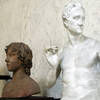Digital Challenges Between Tradition and Innovation
The event entitled “Digital Challenges Between Tradition and Innovation” is the first in the new “New York Loves Italy” series. The series serves as a way to discuss the important roles Italy has in everyday life in New York. The Italian Consul General, Francesco Genuardi, says that this initiative began after his first seven months in the city, when he and his team became aware of the incredible flow of energy, passion, and talent which needed to be shared with the public. They realized that Italians and New Yorkers share the same goals for the future and the team hopes to be the spark that inspires further conversation.
Given that lately there had been huge investments made in the digital market, the Italian Consulate invited guest speakers Sree Sreenivasan, the Chief Digital Officer of New York City and Gianni Riotta, journalist and professor at Princeton University, to chat.
All the way back in 1967, famous Italian writer Italo Calvino put forth the idea that computers will soon write novels. Even though some may be offended at this comment, Riotta says he is a firm believer in this concept. “This is great because there’s nothing in writing a novel peculiar to being human. I can teach a computer how to write a novel because the most important person is not the writer, it’s the reader.” Italy has always had this foresight and has always been a catalyst for innovation in the world. Bringing New York into the picture will only make this incentive even more powerful.
When asked about how we can maintain humanity in the midst of all the technology, Sreenivasan responds that “the Italian love for design, language, poetry, and philosophy, all of that is more relevant today than ever before.” Given that there is still such a huge interest in humanities, all we need to do is figure out the appropriate way of applying technology so that it enhances these areas and doesn’t overwhelm them. When introducing innovation in established places that may be difficult to change, Sreenivasan believes it is pivotal to work with the people who want to step up and do new things. “Try things and let them fail because it’s not obvious that you can do things and they’ll have success. And if they fail, that’s ok. That’s not normally possible at a big organization because the momentum itself makes them very intolerant to failure of any kind.”
Overall, Sreenivasan wanted to get the message across that “the pace of change that we’ve seen in the last 10 years, which is dramatic, is nothing compared to what we’re going to see in the next 10 years.” Things will only get faster and even more dramatic which is hard to imagine at the moment. “This means that we all have a responsibility in choosing the right technologies for how we interact with each other, and not getting caught in doing all the new things. Find the things that make sense for you.”







































i-Italy
Facebook
Google+
This work may not be reproduced, in whole or in part, without prior written permission.
Questo lavoro non può essere riprodotto, in tutto o in parte, senza permesso scritto.